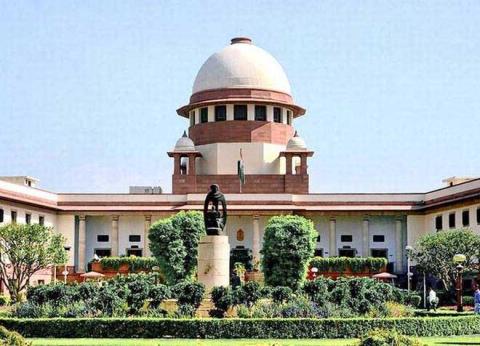National Judicial Data Grid (NJDG), an initiative of the Department of Justice in the Union Law Ministry with the approval of the Supreme Court of India, is a database of orders, judgments, and case details of 18,735 District and Subordinate Courts and High Courts created as online platforms under eCourts Project. Official sources reveal that a decision has been taken to include the Supreme Court of India (SCI) in the NJDG to complete the process. The process of completing the formalities by the National Informatics Centre (NIC) is over, for launching on the eCourts App. With this, entire Indian judiciary will be available on the eCourts App, both on mobile and online computing devices. Judiciary in India has been organized in a unitary system with the Supreme Court at the top. The SCI has the widest jurisdiction compared to any other Supreme Court in the world as it (SCI) can be approached against decisions by any court or tribunal on constitutional laws, central laws and local laws. SCI’s decision is final.
The connected District and Taluka courts update data on NJDG on a real time basis. It provides data relating to judicial proceedings/decisions of all computerized District and Subordinate Courts of the country. All High Courts have also joined the NJDG through web services and eCourts App, providing easy access facility to the litigants. Through the eCourts services platform using elastic search technology, currently litigants can access case status information relating to 21.12 crore (211.2 million) cases and more than 18.73 crore (187.3 million) orders/judgments by these computerized courts. Data also includes over 75 lakh (7.5 million) judgments/orders of the High Courts as on date. Case data is available on NJDG for both civil and criminal cases with the availability to perform drill-down analysis based on the age of the cases as well as the State and District.
NJDG works as a monitoring tool to identify, manage and reduce pendency of cases. It helps to provide timely inputs for making policy decisions to reduce delays in disposing of cases and also helps in reducing pendency of cases. It also facilitates better monitoring of court performances and systematic bottlenecks, serving as efficient management tools. To track cases of land disputes, land records data of 26 States have been linked to NJDG. The World Bank in the Ease of Doing Business report for 2018, that it made possible to generate case management reports, making it easier to enforce contracts, lauded NJDG, launched by the UPA Union Government.
As a sequel to the National Data Sharing and Accessibility Policy (NDSAP) of the Union Government, Open Application Programming Interface (API) has been provided to the Central and State governments to allow easy access to the NJDG data using a departmental ID and access key, allowing institutional litigants as also future litigants.
Recently, reasons for delay have been added in NJDG. Inclusion of feature specifying reasons for delay on the NJDG portal has the potential to keep a proper track on issues which the judiciary faces while adjudicating cases that enables judiciary and the decision makers to take various steps in redressing the burgeoning pendency of cases. Apart from that individual reasons for delay highlight the problems at a granular level, which otherwise would be cumbersome for tracking and remedial.
Latest data reveals that 4.7 crore (40.7 million) cases are pending in Indian courts. Of these, 87.4 per cent cases are pending in District and Subordinate courts, 12.4 per cent in High Courts and 1,82, 000 cases pending for over 30 years.
With the NJDG having covered entire judiciary comprising the Supreme Court of India, High Courts, Tribunals, District and Subordinate courts, its free access to the people will go a long way in peeping in the top judicial minds in Indian judiciary, how the judiciary has shaped the evolution of rule of law based system of constitutional democracy,regulating orderly human conducts in all walks of lives, upholding people’s fundamental rights to life and personal liberty, as defender and preserver of the Constitution of Indiain making the country an egalitarian society, through interpretation and modification in the laws enacted by the Parliament and State Legislative Assemblies over the years to make India a well meaning functional democracy where people can enjoy their full potential as a law abiding citizens with attendant human fundamental rights. Power of judicial review of any decisions including laws enacted by the Parliament and State Legislatures provide checks and balances on the excesses of the executive (government).
But notwithstanding all such shining glories of Indian Judiciary, people are dismayed that our judiciary led by the Supreme Court has caved in during the last over eight years since 2014 to the covert blackmail by the current one man RSS Pariwar fascist union government, reversing all the shining good things about the Indian democracy having been reduced to electoral despotism with the Prime Minister as despot thus reducing electoral democracy to a sham. It has always the case that during our turbulent trying times, individual judges in the High Courts and the Supreme Court have been outshining. When all the public institutions have failed to work as checks and balances on the government of the day, the only hope of the judiciary rescuing the people in the current darkest times diminished to its lowest. One hopes that there will be light beyond the present dark tunnel.
Nevertheless, NJDG will benefit largely, law students, law researchers, academics, lawyers, corporate and computer literate people with free access as its USP. Presently, there are several private portals where laws, rulings of the SCI and High Courts can be accessed for a hefty price making accessibility unaffordable to students, researchers, lawyers, courts and other stakeholders. NJDG is expected to improve further in the days to come with its appeal and accessibility simplified further!
